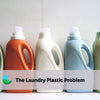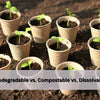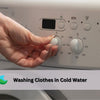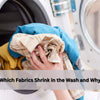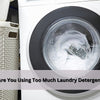How to Remove Water Stains From Glassware?
- by Brodie Cook

Open your glassware cabinet. Check how clean your glassware is. Have you noticed hard water stains on it? They can make your glassware dull, cloudy, and less visually appealing.
In the hospitality industry, especially in a hotel, dull and cloudy glassware is a big no-no. It gives the impression of poor hygiene and low standards. However, at home, when visitors come over, having sparkling clean glassware is equally important. It enhances the dining experience but also reflects your attention to detail and care for your guests. Ensuring that your glassware is free from water stains can enhance the overall ambience of your home and make a lasting impression on your guests.
Don't leave water stains sitting for too long. The untreated water stains on glassware can lead to a permanent build-up, reduce the clarity of the glass, damage it, and even shorten the lifespan of our glassware.
Do you have no time to deal with stubborn, hard water stains? Then this is the right article to learn how to remove hard water stains from your glassware and get a streak-free finish.
What You'll Need to Remove Water Stains
Here are simple tools that you need to remove water stains:
- Microfibre cloth
- Spray bottle (refillable)
- Non-abrasive sponge
- Measuring spoon
- Rubber Gloves
- Measuring cup or jug
- Mixing Bowl
- Bucket
- Cleaner solution
7 Effective Ways to Remove Hard Water Stains from Your Glassware
Need help choosing the right solution? Here are a few options that work well for hard water stains.
1. White Vinegar
The white vinegar contains acetic acid at around 5%, which is effective in dissolving calcium and magnesium. Once calcium and magnesium dissolved, they could remove the water buildup.
Is it safe to use white vinegar? Yes, it is safe for daily use on glass surfaces. This is one hack to remove hard water stains from glass. It doesn’t just work on your glassware stains, but also on any kind of glass surface.
This is how to remove the water stains from glass surfaces:
- Prepare a 1:1 ratio of white vinegar and water.
- Mix the white vinegar and water in a mixing bowl or bucket.
- Soak the glassware in the bucket filled with the white vinegar and water solution.
- Let it sit for 5-10 minutes.
- Gently scrub with a non-abrasive sponge or microfibre cloth.
- Rinse with clean water and dry immediately to avoid new stains.
2. Baking Soda Paste
Baking soda paste is mildly abrasive. It could prevent the water stains from thickening on your glassware. Want to get the best result? You can mix it with the vinegar. Here's how baking soda paste keeps your glassware streak-free.
- Mix 1 tablespoon of baking soda powder with a small amount of water. Don't let it be liquid. Make it a baking soda paste.
- Apply the paste to the hard water stains on the glass with a circular motion.
- Rub gently with a soft cloth or your fingertips.
- Rinse with warm water, then dry.
3. Apple Cider Vinegar
Another hack is using apple cider vinegar. Does it sound new to you? It contains acetic acid and malic acid. It can work well, like white vinegar, to remove stubborn hard water stains. But, it has a stronger scent and can leave more residue than white vinegar.
Still, the apple cider vinegar is worth trying. Try these steps!
- Mix the apple cider vinegar with water in a 1:1 ratio.
- Fill the apple cider vinegar and water solution into a bottle spray.
- Spray the vinegar into the water stains on your glassware.
- Gently scrub with a dry cloth to get lint-free.
- Rinse the glass with clean water.
- Dry the glass with a microfibre cloth.
4. Lemon Juice
Lemon juice is one of the most effective natural cleaners. It not only removes stains but also helps restore your glass to its clear appearance by removing residual soap and mineral buildup.
Why is lemon juice effective in getting a streak-free finish? Because it contains citric acid to dissolve the mineral and magnesium. The antibacterial effect cleans and makes the glass surfaces fresh. The important thing is that the lemon juice left the natural fragrance.
Give this a go! Steps to remove stubborn water stains with lemon juice:
- Prepare the salt and lemon juice.
- Mix the sparkle salt with the lemon juice.
- Wear gloves to protect your hands, as the lemon and salt can cause a warming or tingling effect.
- Gently scrub with your finger or by using a soft-bristled brush onto the glass in a circular motion.
- Let it sit for 5-10 minutes.
- Rinse and dry the glassware.
5. Coconut Oil
If you're not satisfied with the result of the baking soda paste yet, you can mix the baking soda with coconut oil. Coconut oil could add a shine to your drinking glass.
How to use baking soda and coconut oil?
- Apply a small amount of coconut oil to the glass surfaces.
- Sprinkle with baking soda to form a light paste.
- Gently scrub to enhance shine and lift light stains.
- Rinse well thoroughly to ensure there is no oil residue.
6. Citric Acid Solution
The citric acid solution is the best option. It is very effective in dissolving limescale because it contains strong but safe citric acid, especially on stubborn stains. Used in industry too.
How to use it in daily use for removing water stains on your glassware?
- Dissolve one tablespoon of citric acid in 240 ml of warm water.
- Pour into a spray bottle or use for soaking.
- If you want to soak the glassware, soak the glassware with citric acid solution, and let it sit for 5-10 minutes.
- Don't forget to wear gloves to protect your hands.
- Gently scrub, rinse, and dry.
7. Dishwashing Detergent Sheet
Instead of using glass cleaner to remove hard water stains, you can use a dishwashing detergent sheet. The glass cleaner tends to hard for your glassware.
Is it safe to use detergent for your glassware? The answer is yes, if you're using Lucent Globe Dishwashing Detergent Sheet. Because the ingredients are safe for daily use, and no bleach or phosphates are used.
What makes the Lucent Globe Dishwashing Detergent Sheet good for removing stubborn hard water stains? The ingredients, like Sodium Citrate and Sodium Carbonate, effectively work in removing hard water stains.
The Sodium Citrate binds calcium & magnesium ions that cause water stains. Meanwhile, Sodium Carbonate softens water and dissolves light water buildup.
How to use a detergent sheet to remove the water stains? Here are the steps by step:
- Put a detergent sheet into a sink filled with water. It will dissolve like magic.
- Soak the glassware for 5-10 minutes.
- Rinse thoroughly and dry the glassware straight away.
Common Causes of Stubborn Hard Water Stains
In our common household, hard water stain is something we face, especially on glassware. What is the factor causing hard water stains on glassware?
The US National Geological Survey proved that the common cause of hard water stains is that hard water contains dissolved minerals, such as calcium and magnesium. When they're dried, they leave behind mineral deposits. Once left untreated, it could lead to permanent marks.
Preventing Hard Water Stains from Glassware
Now that you know the causes of stubborn, hard water stains. What's next to avoid damage to your glassware? You can try these best practices.
- Dry the glassware immediately with a microfibre cloth after washing.
- Use soft water if it is possible. If you live in an area with hard water, consider installing a water softener.
- Add the vinegar and water mixture while rinsing the glassware.
- Use a rinse aid in the dishwasher.
- Wash with a dish soap containing sodium citrate or sodium carbonate, such as the Lucent Globe Dishwashing Detergent Sheet.
- Don’t let water dry on the glass surface.
- Wipe down the glass immediately after rinsing, especially if the water is high in minerals.
- Do this once a week to prevent the buildup of stubborn stains.
- Store glassware in a dry, well-ventilated area.
- Avoid condensation and moisture that can leave spots.
Keeping your glassware sparkling doesn’t have to be hard. It just sticks to a simple routine and uses the right ingredients.

 Dishwashing
Dishwashing Laundry
Laundry Bundles
Bundles Surfaces
Surfaces Toilet
Toilet Handsoap
Handsoap Multi-Purpose
Multi-Purpose Floor
Floor
